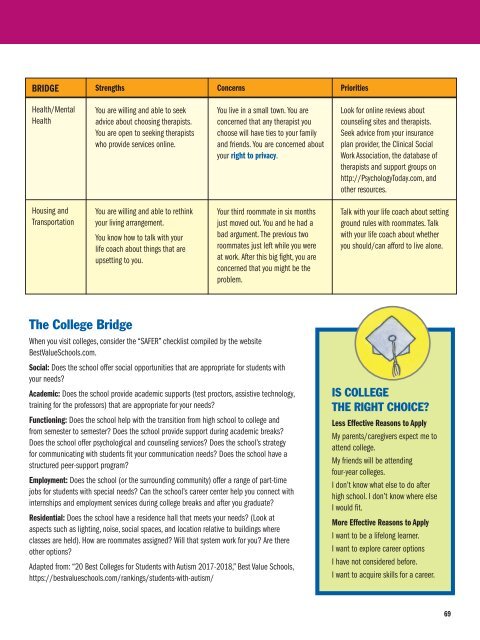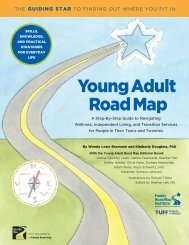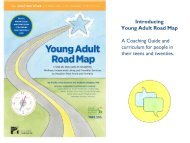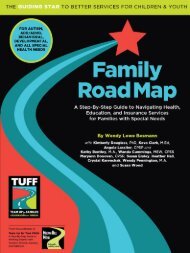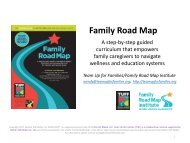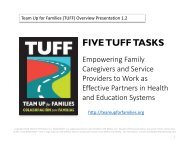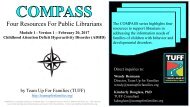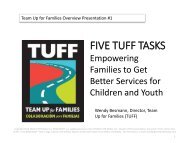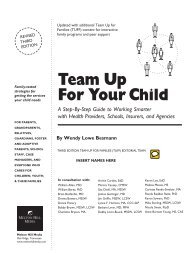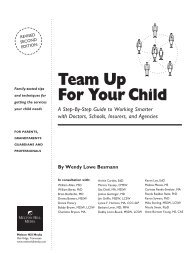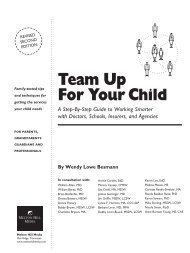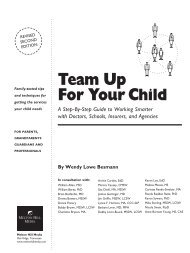Look Inside Young Adult Road Map
You also want an ePaper? Increase the reach of your titles
YUMPU automatically turns print PDFs into web optimized ePapers that Google loves.
BRIDGE<br />
Strengths<br />
Concerns<br />
Priorities<br />
Health/Mental<br />
Health<br />
You are willing and able to seek<br />
advice about choosing therapists.<br />
You are open to seeking therapists<br />
who provide services online.<br />
You live in a small town. You are<br />
concerned that any therapist you<br />
choose will have ties to your family<br />
and friends. You are concerned about<br />
your right to privacy.<br />
<strong>Look</strong> for online reviews about<br />
counseling sites and therapists.<br />
Seek advice from your insurance<br />
plan provider, the Clinical Social<br />
Work Association, the database of<br />
therapists and support groups on<br />
http://PsychologyToday.com, and<br />
other resources.<br />
Housing and<br />
Transportation<br />
You are willing and able to rethink<br />
your living arrangement.<br />
You know how to talk with your<br />
life coach about things that are<br />
upsetting to you.<br />
Your third roommate in six months<br />
just moved out. You and he had a<br />
bad argument. The previous two<br />
roommates just left while you were<br />
at work. After this big fight, you are<br />
concerned that you might be the<br />
problem.<br />
Talk with your life coach about setting<br />
ground rules with roommates. Talk<br />
with your life coach about whether<br />
you should/can afford to live alone.<br />
The College Bridge<br />
When you visit colleges, consider the “SAFER” checklist compiled by the website<br />
BestValueSchools.com.<br />
Social: Does the school offer social opportunities that are appropriate for students with<br />
your needs?<br />
Academic: Does the school provide academic supports (test proctors, assistive technology,<br />
training for the professors) that are appropriate for your needs?<br />
Functioning: Does the school help with the transition from high school to college and<br />
from semester to semester? Does the school provide support during academic breaks?<br />
Does the school offer psychological and counseling services? Does the school’s strategy<br />
for communicating with students fit your communication needs? Does the school have a<br />
structured peer-support program?<br />
Employment: Does the school (or the surrounding community) offer a range of part-time<br />
jobs for students with special needs? Can the school’s career center help you connect with<br />
internships and employment services during college breaks and after you graduate?<br />
Residential: Does the school have a residence hall that meets your needs? (<strong>Look</strong> at<br />
aspects such as lighting, noise, social spaces, and location relative to buildings where<br />
classes are held). How are roommates assigned? Will that system work for you? Are there<br />
other options?<br />
Adapted from: “20 Best Colleges for Students with Autism 2017-2018,” Best Value Schools,<br />
https://bestvalueschools.com/rankings/students-with-autism/<br />
Is College<br />
the Right Choice?<br />
Less Effective Reasons to Apply<br />
My parents/caregivers expect me to<br />
attend college.<br />
My friends will be attending<br />
four-year colleges.<br />
I don’t know what else to do after<br />
high school. I don’t know where else<br />
I would fit.<br />
More Effective Reasons to Apply<br />
I want to be a lifelong learner.<br />
I want to explore career options<br />
I have not considered before.<br />
I want to acquire skills for a career.<br />
69


